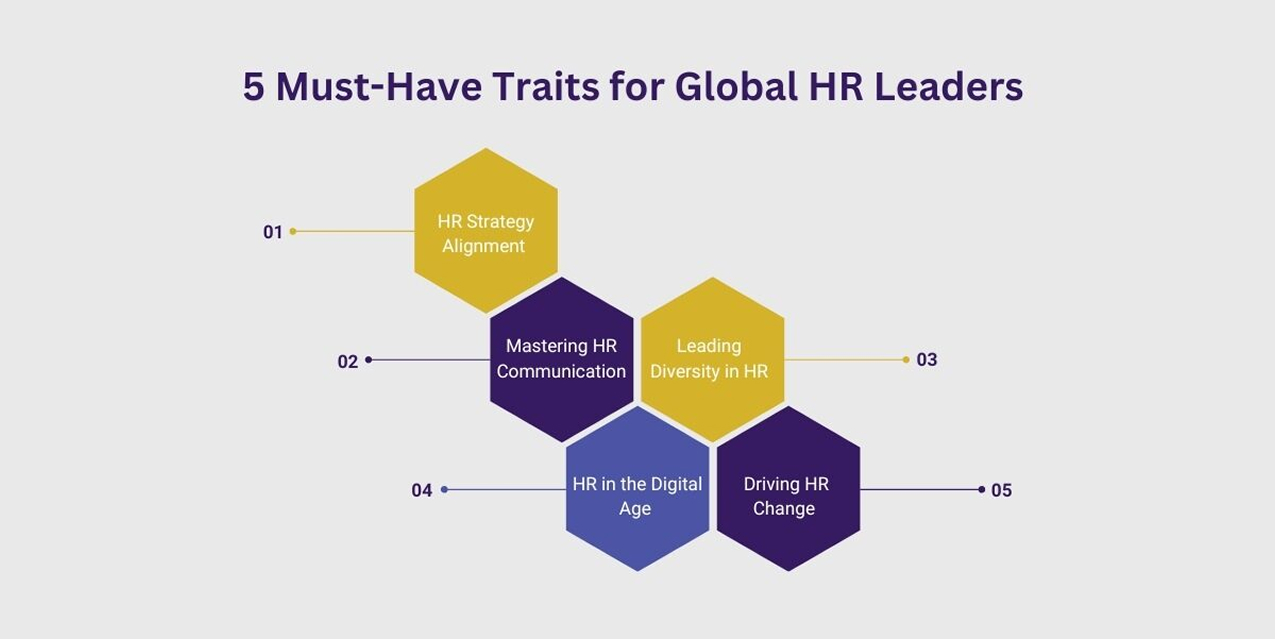
The workforce is rapidly globalizing. As talent and operations span across countries, the role of HR leaders is evolving. Besides managing local HR needs, now HR heads have to handle global complexities as well. They are working across borders, cultures, and time zones to create a unified employee experience.
So, what makes HR leaders ready for global success? This article explores the key traits that define successful global HR leaders.
Leadership traits play a vital role in driving organizational success. Certain key attributes allow leaders to effectively steer their teams and companies towards achieving goals and objectives. This section will explore the significance of having strong leadership traits and how they contribute to organizational prosperity.
Possessing crucial leadership qualities enables managers to lead their teams more efficiently. Attributes like strong communication skills, emotional intelligence, and the ability to inspire others have a direct correlation with leadership success. Leaders who incorporate these traits into their management approach can gain increased employee trust, improve team collaboration, and boost workplace morale. This produces a positive culture that drives both employee well-being and organizational growth.
Key leadership traits that enhance management effectiveness include:
Retaining top talent has become a strategic priority for human resources departments today. Skilled individuals drive a disproportionate amount of organizational success. Effective leaders directly impact talent retention through the environments they create.
Supportive leaders focused on employee growth and development tend to foster engaging cultures where workers feel valued and wish to remain. Specific traits that help leaders retain talent include:
The retention power of leaders with these traits results in huge cost savings from reduced hiring expenses and maintained institutional knowledge.
The capability to outline a strategic vision and enlist others to work towards realizing that vision is paramount. Leadership traits like decisiveness, focus, and accountability enable quicker execution of corporate strategy.
The combination of efficiently outlining strategic priorities and tenaciously pursuing their achievement with the help of motivated teams allows strong leaders to reach targets faster. Companies led by decisive, focused and accountable leaders consistently outperform the competition.
The possession of key leadership attributes equips managers to handle the most crucial elements of guiding an organization to prosperity. Enhancing leadership capability, retaining top talent, and achieving strategic goals all hinge largely on incorporating the right mix of traits into one’s leadership approach. The leaders most capable of lifting their companies to new heights exemplify these vital characteristics. Organizational success in the modern business climate necessitates leadership that displays these productive qualities.
Let’s explore the 5 essential traits every global HR leader should possess.

Forward-thinking Global HR leaders consider workforce needs from a broader strategic perspective. With business objectives as their true north, these leaders make decisions to achieve those goals.
For instance, if the company aims to expand in a new market, the HR head would plan the hiring, training, compensation etc. to support that ambition. They would even advise the senior management on potential challenges in that location and how to mitigate risks.
Such strategic alignment of HR priorities with business goals is crucial for global victory.
Managing global teams calls for stellar communication abilities. And HR must lead by example.
For seamless collaboration worldwide, global HR heads need to convey complex people strategies clearly across borders. They have to present ideas persuasively to senior management and implement changes smoothly on-ground too.
This requires top-notch articulation skills - both written and verbal. Plus, emotional intelligence promotes two-way communication across cultures. They encourage employee participation, address concerns empathetically, and resolve conflicts effectively.
A major part of leading HR globally is about managing diversity with cultural intelligence.
HR heads today must have cross-cultural competence to develop inclusive policies for a globally dispersed workforce. They should educate teams worldwide on mitigating unconscious biases and build sensitization on working alongside varied racial, ethnic and social groups.
By promoting diversity and belongingness, culturally agile HR leaders enable every employee to contribute productively towards shared organizational goals. This culture framework also attracts top global talent that drives innovation.
Technology is transforming how we work. And HR must champion this change for humans to thrive alongside machines.
HR heads are increasingly making workforce decisions based on data analytics. They are leveraging AI for tasks like recruitment and learning. Even leveraging VR for advanced training.
Such digital dexterity allows HR leaders to provide personalized, scalable and engaging employee experiences across regions. Right from hiring to retirement, every people process is getting technology-powered today.
HR should not just enable this digital shift for employees but also upskill themselves to thrive in the future workforce.
The volatile world calls for HR heads who can navigate uncertainty. The workforce of tomorrow will need upgraded skills, environment-friendly workspaces, gig opportunities, and more.
Only if HR leaders have an agile mindset to implement new ideas can they lead company-wide change effectively. They should continuously learn about global HR best practices and find innovative ways of organizational development.
While resistance to change is natural, influential HR heads act as change champions. They help employees understand the why behind decisions and assure them during transitions.
This change-ready attitude is vital as the workforce and workplace continue to transform.
The current business landscape has highlighted people strategy as mission-critical for organizational success. And global HR heads have the huge responsibility of steering their worldwide workforce towards collective progress.
During constant flux, these influential leaders provide direction by making principled and future-focused decisions. They help companies tap into the limitless potential of global talent.
As organizations aim for responsible growth worldwide, global HR heads act as the guiding light. They build a culture where employees feel secure to take risks, upskill fearlessly and innovate collaboratively.
So, while globalization expands the canvas for business functioning, capable HR leaders make sure that human potential continues to be nurtured. By prioritizing people, global HR leaders ensure that what makes international companies great is their workforce.
As workforce needs get complex across countries, the strategic and humane leadership capabilities of Global HR heads will be the competitive differentiator for global success.
Achieving global workforce alignment calls for HR heads to wear multiple hats. Beyond managing routine HR responsibilities, they have to tackle international complexities as well.
It requires foresight to plan for future disruptions, communication expertise to liaise worldwide, technological know-how to enable digital transformation, and change leadership to drive organizational development seamlessly.
While the profile of the global HR leader continues to evolve, some trademark traits empower talent heads to make a transformational difference. By embracing a strategic mindset, strong communication skills, cultural intelligence, digital fluency and a change-ready attitude, HR can catalyze global success.
So, as your company expands its footprint internationally, ensure that your HR leadership has the competence and vision for this growth journey. Allow them to nurture a future-ready global workforce that sustains competitive advantage.
The success of globalization ultimately boils down to the capabilities of global talent. And HR plays the leading role to unlock human potential without geographic constraints. Back your top HR leaders as they steer your worldwide workforce towards collaborative achievement.